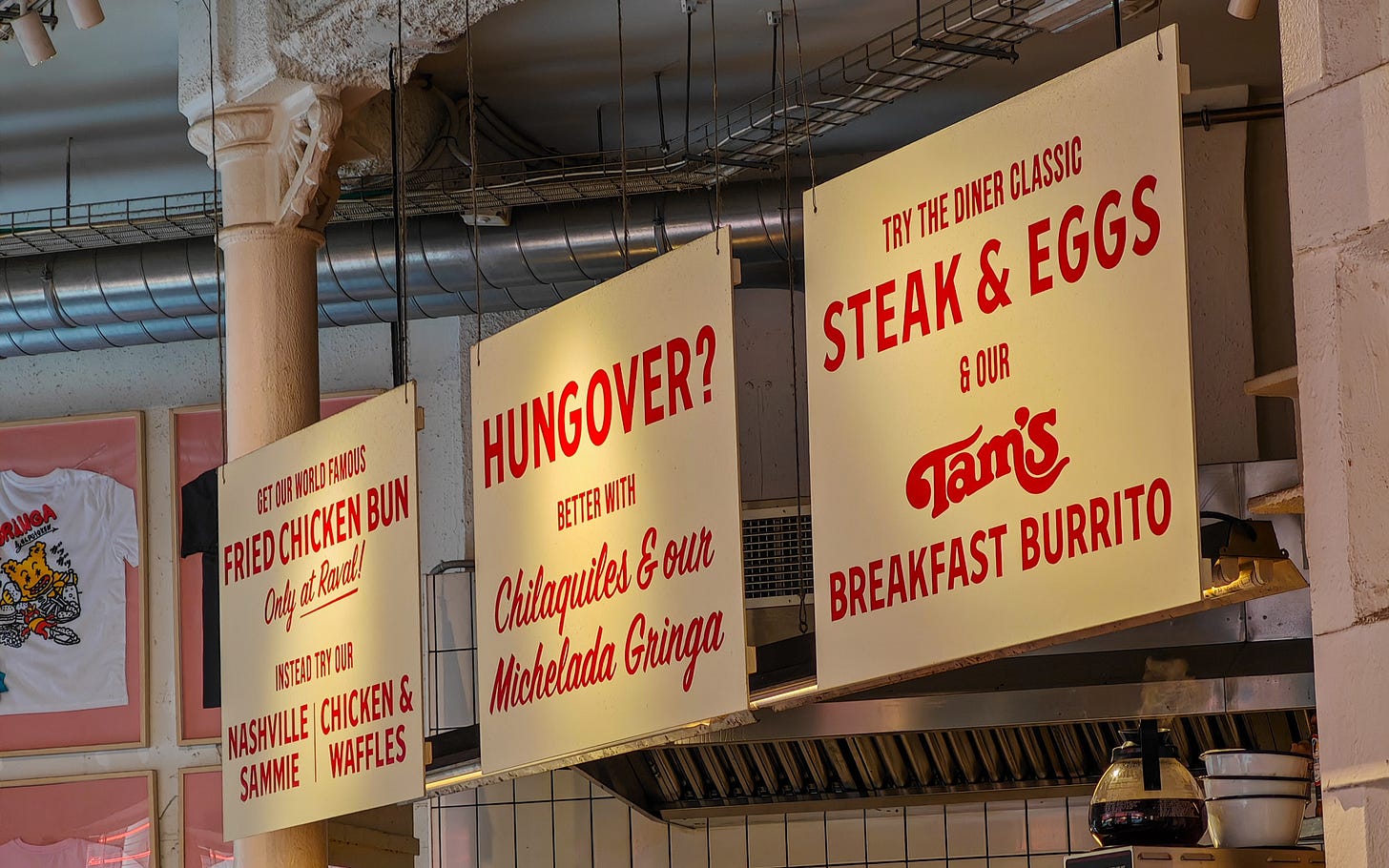FT's 'Avengers Assemble.' Office Mandates Failing Moms. Cash Crazy. Critics & More.
Rayner follows the Rules. Dent at the Bar. Ivers crowds in Tamil. Sandy Toksvig guests for the Observer.
First of all, a massive welcome to the big influx of new subscribers. Thank you so much for joining the fun. It’s a busy week this week with the FT launching its new team, an exciting announcement from Vittles, some depressing data on back-to-work from The Economist, and debate about the role of cash in restaurants. This week’s Critics Wrap-Up is, as usual, at the bottom. I was planning to launch a reader survey this week, but due to the large number of items, I’ve decided to hold it for next week, along with a surprising ‘Miss’ at a well-regarded new Belgravia spot. I’ve got about a half-dozen reviews on the go as well, and haven’t decided which one to run this week, so you can look forward to a surprise on Thursday.
In the meantime, if you’re new, I would be really grateful if you would share your favourite place for a Professional Lunch in the Comments and spread the word about the site to your friends and colleagues.
FT Dream Team Launches
I love the comic book super-hero feel of this week’s headline image from the FT Weekend Magazine. Four of the UK’s most significant restaurant and food writers now assembled in an unparalleled dream team. And the kick-off is every bit as strong as any reader could wish.
Mostly, it's a whole lot of fun.
Editor Harriet Fitch Little, who masterminded this coup, explains: “To mark this happy occasion, we asked our experts to share some pearls of wisdom shucked from their collective century-plus as professional diners. They responded with a set of rules about how to make the most of eating out in 2025. We read those rules, stroked our chins in admiration, pinned them to poster boards, booked tattoo appointments etc. And then? Then we sent them for comment to a panel of the world’s most esteemed food connoisseurs, who ripped them to shreds.”
The review panel includes Jonathan Nunn, Ruth Reichl, Nigella Lawson,
, and other food and restaurant super-heroes.The resulting piece is funny, occasionally controversial, often tongue-in-cheek, and brilliant. You should read it.
The rest of the launch includes:
The first FT review from Jay Rayner, which gets personal through a visit to iconic Rules in Covent Garden.
A great feature from Tim Hayward on sandwich making.
A reflection from Marina O’Loughlin on the culture of tipping in the U.S. and U.K.
A data story analysing forces that drive restaurant footfall. More on that one next week.
Congratulations to Harriet and the whole FT team. I can’t wait to see what comes next.
Vittles Doing an Actual Magazine
Similarly exciting and significant news from
this week. Jonathan Nunn explains:To mark Vittles’ fifth birthday, we have taken our second leap of faith and made a magazine. We want print to become a permanent part of our future. So much of culture now – food media and Vittles included – is mediated through screens and owned by massive tech companies. As much as this has lowered the barrier of entry, it’s always struck us as slightly perverse that lovingly crafted essays and illustrations arrive in your inboxes alongside work requests and spam, to be read in a state of stress between other emails. In starting a magazine we want to make the case for a slower, more considered form of consumption.
The line up of writers and articles sounds incredible, and offers a much wider range of voices, perspectives, and backgrounds than the FT can possibly match. It’s an essential balancing force, and I can’t wait to read it.
You should definitely go and order a copy.
Back-to-Work Pushing Moms Out
The Economist reflects on the move towards remote working during COVID in the UK, and the subsequent back-to-work U-turn. ONS data shows how remote working benefited working moms, and return-to-office mandates are now driving moms out of the workforce. “By the end of 2023 the difficulty of juggling work and child care had pushed nearly 250,000 mothers out of jobs, says the Fawcett Society, a charity.” … “Female police officers and teachers are also quitting.”
I’ve been a fairly consistent critic of back to office mandates. Indeed, such mandates were a motivation for setting up Professional Lunch. Policies that drive women out of the workforce are self-evidently bad. We know businesses benefit from a diverse range of perspectives. So losing women’s voices will make work worse. And in a macro context, shrinking the workforce makes it harder to get the UK economy growing again. It all adds up to a strong rationale to evolve management approaches to better embrace flexibility and remote working. (Although back-to-office seems to be helping Sainsbury’s by bringing by the big, weekly trolley shop.)
Pressure on Restaurants to Accept Cash
A campaign group called the Payment Choice Alliance, “wants new laws similar to those in some other countries requiring organisations and retailers to accept cash,” according to the Guardian. Apparently Gail’s, Itsu, and Zizzi, among many others, have gone cashless.
Sorry, but I’ve got zero sympathy for this. Seeking a government mandate for something with minimal public support is particularly galling. And how do we know it has minimal public support? Because there’s no market pressure on the restaurants to take cash. If their no-cash policies were actually a problem, customers would vote with their feet and go elsewhere. They aren’t.
And there are advantages of cashless for the restaurants. It reduces operational complexity and lowers the potential for theft and losses — both internal and external. That’s important at a time when cost pressures are immense and growing, especially from the impending NI increase.
Critics Wrap-Up
✍🏻 indicates a review that you should read for the writing.
🍽️ indicates a place that sounds excellent and is probably worth a try.
✍🏻 Jay Rayner (FT) offers his first review for the FT, a visit to Rules in Covent Garden. “I feel the ghost of my mother, a woman who thought imparting a taste for oysters and Sancerre was as important as teaching a child to tie their own shoelaces and say please and thank you.”
✍🏻 Grace Dent (Guardian) tries Bar Valette, the new place in Shoreditch from the creators of the Clove Club. “We were led to believe that Bar Valette would not be at all like that well-known destination-dining spot. Not as formal. … The prices, however, aren’t informal at all and are very much still wearing tuxes, cummerbunds and spats.” And her friend finds plastic in her stew.
🍽️ Charlotte Ivers (Sunday Times) checks out Tamila in Kings Cross for South Indian street food. “The waiter suggests five to eight dishes for two to share, which is great salesmanship. You could order way below that and still walk away satisfied.”
David Ellis (Standard) goes for bottomless lasagne at Senza Fonda in Soho. “No-limit lasagne is not the name of an Italian sex game, though depending on how much pleasure one derives from eating, I don’t deny it could be considered one.” He concludes, it’s “a riot of a good-time restaurant.”
William Sitwell (Telegraph) reviews July in Fitzrovia. “I’ve had millions of canapés, a lifetime of bites and this one won’t be making my list of 1,000 things to put on toast.”
Tom Parker Bowles (Mail on Sunday) is underwhelmed at Alba, from the Big Mama Group, in Knightsbridge. “It’s the less flashy dishes that really disappoint. A dull parmigiana, distinctly average pizza margherita, dreary lamb chops with a strange, sticky gravy and an eminently forgettable farmed sea bream ‘aqua pazza’.”
Nick Lander (jancisrobinson.com) visits the upstairs grill at The Hero in Maida Vale. “The menu, as a whole, I found uninspiringly bald.”
🍽️ Catherine Hanly (Hot Dinners) test drives Himi, a Tokyo-style drinks and nibbles joint in Carnaby Street. “This would be just as good a place to drop in for a glass of cold beer and a couple of small plates as it would be to book in for dinner and give the menu a real going over.”
Halimo Hussein (Vittles), a Somali cook and writer, offers recommendations on the best places for Somali food in London. “I am comforted by how Somali restaurants are emerging as more pluralistic spaces and catering to a more diverse audience.”
Hillary Armstrong (Glossary) tries Sael, which I reviewed earlier. “Sael doesn’t need to borrow from an earlier era. What it’s doing in the here and now is far more interesting.”
Nick Harman (Foodepedia) checks out Tozi Pizzeria in Nine Elms, calling it, “decent … an ideal pitstop place.”
Beyond London
Giles Coren (Times) slams an over-priced Chinese place in London — that he won’t name because he likes their PR person — that’s selling half a duck for £278, apparently. So he instead reviews Vetch in Liverpool. “Even in London, £45 would be a lot for what was very close to no food at all.”
Sandy Toksvig (Observer) guests as the restaurant critic, and reviews Sunday lunch at the Crown in Arford, Surrey. “We need to support these small country inns and local watering holes. The number of pubs in England and Wales is at a record low.”
- (Braise) continues his reviews from his trip to Barcelona, this time checking in from Gringa All Day, an American diner. “That Fried Chicken Benny is the best iteration I’ve tried: a heaving hunk of chicken, sitting crisp in thick, spiced breading, atop a slice of toasted brioche.”
Marina O’Loughlin (FT, via Instagram) returns to Restaurant Le Train Blue in Paris. “Not a single beat was missed, flawless bourgeois French nosh from amuse to cafe gourmand.”
Thanks so much for reading this week’s Professional Lunch update. I hope you’ll subscribe if you haven’t already, and let me know what you think in the Comments.










I LOVED the FT's restaurant dining rules. Genius launch idea for the new line-up. The comments from the panel are hilarious. Something that I will be referring to time and time again.
It's great to read this for the first time, Marshall. What is the reasoning behind pressuring restaurants to eliminate cashless payment options? (He says, stroking his chin suspiciously.) I remember being impressed by how quickly the food industry adapted during COVID-19; in my opinion, it was one of the most agile responses made by any industry on a global scale.